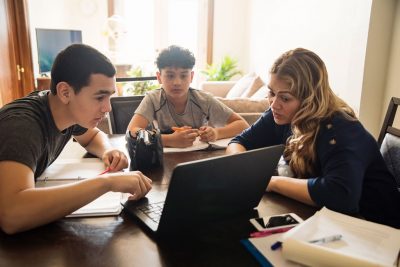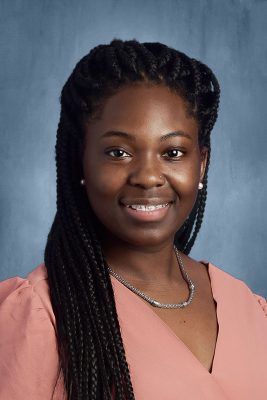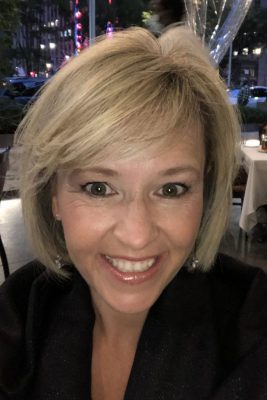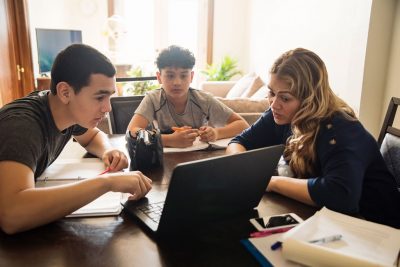
Seventh Annual Change Project Day Features the Work of 2021 UCAPP Grads
Neag School of Education students completing the UConn Administrator Preparation Program (UCAPP) this spring recently presented their capstone projects – the program’s signature final assignment in which students identify a need or opportunity for school improvement and work toward positive change.
During the seventh annual Change Project Day, held virtually last month, UCAPP students had the opportunity “to synthesize and translate to practice everything they’ve learned in the coursework and observed or practiced during the clinical practicum,” says Richard Gonzales, associate professor-in-residence and director of the Neag School’s Educational Leadership Preparation Programs. “It is a structured opportunity to test knowledge and theory in the real world,” he adds.
The UCAPP program went through a redesign in 2020 as part of a nationwide effort known as the University Principal Preparation Initiative (UPPI), funded by the Wallace Foundation. As a result of the redesign, the concept of family and parent engagement became a priority for the first organizational leadership course in UCAPP’s program of study.
Gonzales notes the importance of connecting with parents, pointing out that “effective school leaders proactively seek to work with parents as partners to support student learning.”
Three of the students’ capstone projects focused on parent engagement and were carried out with support from the Hartford Foundation for Public Giving.
“You can create a culture that makes everyone – including families and community partners – feel like they are essential to the fabric of the school community — because they are,” Shuana Tucker, chief talent officer with the Connecticut State Department of Education (CSDE) and former UCAPP adjunct professor told UCAPP grads in her Change Project Day address.
Parent University Night

One capstone project, designed and implemented by UCAPP student Kenterra Carrion, a school social worker for Hartford (Conn.) Public Schools, focused on “building trust, open communication, and positive relationships as a school community.”
The project, titled “Parent University Night,” was hosted by Pathways Academy of Technology and Design, located in East Hartford, Connecticut, to help parents navigate technology and applications their children use during remote learning, while offering support during this unprecedented time as students progress through high school.
The Parent University Night included five sessions, taught by teachers and one parent, on such topics as the effects of COVID-19 on the whole child; suicide prevention; personal wellness; college and career readiness; and social media.
Carrion says she sees parents as an “essential part of building a positive school community, as they are active participants in the learning and development of the whole student inside and outside of school.”
“When parents lead initiatives, communicating with one another about student opportunities and engaging in meaningful conversations with stakeholders, students gain a network of support, encouragement, and inspiration,” she adds.
Carrion wanted her project to represent a commitment to their schools’ students and their “village.”
“As part of the desired outcome of the project, the parents will have an opportunity to build reciprocal relationships, to develop trust and open communication,” she says.
Staff and parents plan to build upon this initiative by hosting another Parent Engagement Night next school year.
Partners in Learning
Nicole Selmanie, an eighth-grade mathematics educator for Burr Middle School in Hartford, led her school’s Family, School, and Community Engagement Committee (FCSE) this past year.
“Parents want the best for their children. We believe they are always willing to support their child’s learning, and thus are the best partners,” says Selmanie. “Research has shown that family involvement in a child’s education matters. It’s essential for our students to reach their full potential that teachers and families are on the same page.”
“Research has shown that family involvement in a child’s education matters. It’s essential for our students to reach their full potential that teachers and families are on the same page.”
— Nicole Selmanie ’12 MSW, ’21 6th Year
Through her leadership as a UCAPP student, the FSCE had been analyzing data on school climate and family input, which led the committee to focus partnering with families to improve student learning. The data revealed a disconnect between families, staff, and students in terms of partnering to support student learning.
The project developed by Selmanie included researching, recommending, and having the school install a new communication platform, Class Dojo. The platform provides a streamlined communication system accessible to all members of the school community, regardless of their preferred language.
In addition, her project involved incentivizing family participation in Learning Night and other events. Learning Night, which will be held in June, will provide the opportunity to collectively create a system for staff and families to support student learning. Leading up to Learning Night, students on the FCSE have been hosting Student Voice Sessions to gather student feedback on their needs and insights into their learning.
Selmanie says her UCAPP experience has taught her how to be an administrator and given her practice being one, too. In addition to UCAPP’s redesign focus on parent engagement, she found the emphasis on equity and anti-racism key to her decision to join the program.
“This solidified my choice and was the only program I applied to,” she says.
Collaboration With Parents

Sherry Farmer, a special education teacher at Jeffrey Elementary School in Madison, Connecticut, also focused on parents for her UCAPP capstone project. She says she realized that more affluent communities like Madison still need to focus on family engagement, even though it’s “easy to assume that it’s not an issue there.”
“It became apparent during the pandemic that there is more work to be done in making parents true partners in our work so they can understand the ‘why’ behind educational and curriculum decisions and feel confident in their ability to support their children,” Farmer says.
The initial idea for the project came from parent survey feedback from the school district in the spring of 2020, when schools first closed due to the pandemic. Parents, Farmer says, “indicated feelings of frustration and misunderstanding surrounding curriculum, instruction, and how to support their children in this new model of teaching and learning.”
Farmer’s project included reviewing data from parent surveys and working with a team of educators across the district to determine next steps. They collectively decided to begin with live webinar series addressing six specific topics during the first trimester of the school year. From follow-up surveys, they discovered that while parents appreciated the webinars, parents of kindergarteners indicated a need for more specific support in foundational reading skills, and parents of juniors and seniors wanted more insights into college readiness.
Many families in the district have the economic means to hire external college counselors. Still, some felt lost in the process or were unable to afford that support. Panels on “Navigating the College Selection Process” were designed to feature various types of higher education institutions (a local Connecticut college, a Big Ten school, a community college, and a trade school). These panels were converted to webinars and shared with the high school students and their parents.
“I was hesitant to take on a project this large in scale, but it turned out to be one of the best learning experiences I had while in the UCAPP program.”
– Sherry Farmer ’21 6th Year
Webinars focused on literacy and reading skills were sent to the kindergarten parents, with students receiving packets to take home that included copies of all the games presented in the videos and a book that allowed them to practice various skills.
Originally, the project was going to serve Jeffrey Elementary exclusively, but the assistant superintendent invited Farmer to involve the district as a whole.
“Initially, I was hesitant to take on a project this large in scale, but it turned out to be one of the best learning experiences I had while in the UCAPP program,” she says.
The school district is already looking ahead to next year, when it hopes to continue sharing the webinars.
Reflecting on the program during Change Project Day, Tucker of the CSDE recommended to the future administrators that they “welcome and foster … relationships, keep an open mind and your ear to the group, because staying connected to the community you serve will benefit your work in the long run, sometimes in ways you may never expect.”



